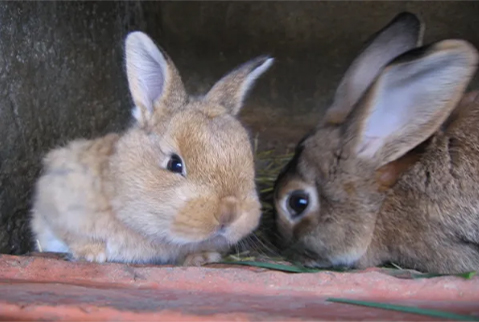Caring for your Rabbits

Rabbits can be wonderful pets but they need more than carrots and cuddles to keep them healthy.
Rabbits have complex needs and require just the same amount of time, love and care as many other larger animals. Rabbits love company so it’s better if they live in pairs.
Dental Care For Rabbits
Rabbits have four large incisors (front teeth), behind their upper incisors there are two tiny incisors known as the peg teeth. Rabbits also have six upper and five lower molars (cheek teeth) on each side. The rabbit’s incisors are used to cut through vegetation whereas the molars are used to chew and grind down food into smaller pieces. In order to compensate for the constant wear their teeth receive, their teeth are ‘open rooted’ meaning they grow continuously throughout their lives.
How diet can be part of good dental care
If a rabbit consumes a diet which is low in fibre, such as a poor quality mix or pellet only diet, this will not be a sufficient amount of fibre to wear down the rabbit’s teeth. The then tooth grows higher and meets the opposing tooth in an abnormal position. This leads to abnormal wear, which leads to sharp edges to the tooth – these are known as spurs. These spurs can cut the tongue and cut into the cheeks, potentially resulting in soft tissue damage, ulceration and abscesses. When rabbits teeth don’t meet this is termed malocclusion. Maloccluded teeth result in abnormal pressure against one another resulting in root impaction and elongation of the teeth. It is these impacted roots which may eventually result in jaw abscesses. Once a rabbit has malocclusion it is highly unlikely he will ever have normal teeth again and will require regular anaesthetics to file his teeth. Rabbits can be given a dental just like cats and dogs but as always, prevention is better than cure. By carrying out tooth trims and increasing the amount of fibre in the rabbit’s diet we can keep them more comfortable and improve their quality of life. It is vitally important that rabbit owners are aware of these complications so they can monitor their animals and detect problems early, which will result in a better success rate for dental procedures. Our vets can give your rabbit a full dental check and will be able to advise you on a nutritionally-balanced diet to help reduce dental disease.
Microchipping Your Rabbit
Pet rabbits, whether indoor or outdoor are just as likely as dogs or cats to escape into the big unknown which is why it is important to microchip your rabbit. Your rabbit cannot wear a collar so a microchip is the only form of identification a rabbit can have. Losing your rabbit would be very distressing and it is extremely difficult to reunite an owner with their lost pet if the pet cannot be reliably identified.
What happens when you microchip my rabbit?
During microchipping, our vets will inject a tiny microchip (about the size of a grain of rice) under the loose skin of your rabbit’s neck, which will give your rabbit his own personal identification number. It’s quick, painless and very safe. Should your rabbit stray and get handed in to a veterinary surgery, rescue centre, the police or local authority, they have special hand held scanners that can detect and “read” the information on the microchips.Once your rabbit’s unique number has been checked against the national database and identified him as yours, you will be reunited without further delay.
Neutering Your Rabbit
Neutering pet rabbits is now a common operation. Neutering stops rabbits getting nasty diseases such as uterine cancer in females and testicular cancer in males.
Neutering also reduces the chances of aggression and allows males and females to live together without the risk of babies. They will make better pets as they will be much calmer.
Generally, females can be spayed from six months old and males can be neutered as soon as the testicles descend, usually around three and a half months of age.
Nutrition And Diet
Males
One of the major contributing factors for illnesses in rabbits is poor feeding regimes. Rabbits are herbivores and need a nutritious, balanced and interesting diet. We recommend a feeding ratio of the following:
Does Roughage play any role in my bunny's diet?
Long roughage (hay) is essential rabbits for healthy digestion, as it also combats boredom creating a natural foraging instinct and aids with dental care allowing the rabbit to naturally wear down its teeth as they continually grow. Many commercial rabbit mixes allow the rabbit to selectively feed, this means it picks out the pieces of the mix it likes and leaves the rest, thus not having a balanced diet. We stock a wide range of palleted food which gives a balanced nutrition with every mouthful.
How do I vary my rabbit's diet?
Including green stuff, root vegetables and fruit in small amounts helps add variety rabbits diet. Some plants readily available from your gardens such as sunflowers, are also very nutritious but should always be washed first. Bear in mind common garden plants can also be poisonous and sometimes fatal to your rabbit, so make sure you know what you are feeding is safe. Ask us for a list of of dangerous plants. A diet that is high in fibre will also aid in the process of “caecotrophy”, this is where your rabbit eats one type of their own faeces as a means of enhancing its total nutritional intake. The second type of faeces produced is the small hard droppings which can then be removed from its dwelling. This is an important process in your rabbit’s digestion and will help prevent problems in the gut and blockages that may occur. We recommend introducing changes to diet gradually over a period of 10 days as sudden changes may result in loss of appetite or even refusal to eat.
Vaccinating Your Rabbit
We believe that ‘prevention is better than cure’ and just like dogs and cats, rabbits also need vaccinations against infectious diseases they are at risk from. This also provides a valuable opportunity for your rabbit to have a health check with one of our vets.
Vaccinations for rabbits
We recommend rabbits be vaccinated biannually (every 6 months) against calicivirus.
Viral Haemorrhagic Disease (VHD1&2*)
Most affected rabbits die rapidly without showing obvious clinical signs apart from a short period of dullness and lethargy. These diseases are preventable with vaccination.
It’s never too late to start a vaccination programme. If you have an older rabbit, it is not too late to start a vaccination programme and your vet can advise you on this. Older rabbits often have a weaker immune system so it is especially important to give them a helping hand and keep their boosters up to date.
Healthcheck
At the time of vaccination, your vet will also give your rabbit a thorough clinical examination that can alert us to health problems. It is particularly important to make sure your rabbit’s teeth are check at least every six months, as pet rabbits are very prone to dental disease which can have very severe consequences if not picked up early. This examination is as vital for the well-being of your rabbit as the vaccination and is a valuable opportunity for you to discuss any concerns or queries you may have about your rabbit’s health.
